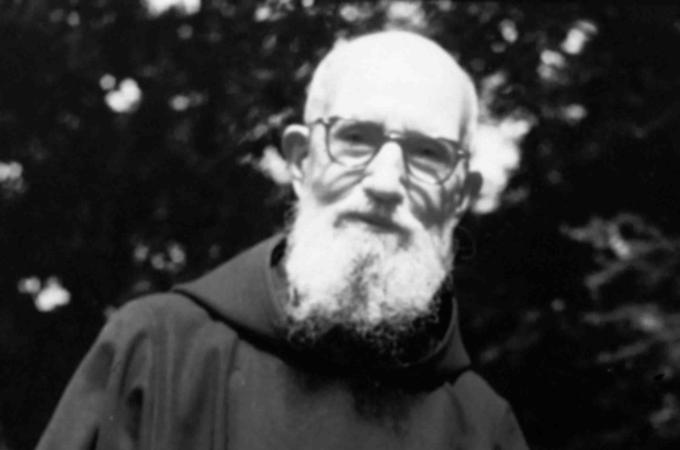Thanking God ahead of time for the beatification of Solanus Casey
The Saturday before Thanksgiving, on Nov. 18, 2017, an American Capuchin priest named Solanus Casey will be beatified in Detroit, 60 years after his death in 1957 at the age of 86. He is the first American-born male to have been declared venerable for his "heroic virtue" -- back in 1995 by St. John Paul II. Others have been declared venerable since then, most notably Archbishop Fulton J. Sheen, the famous broadcast evangelist, who died in 1979, and Father Nelson Baker, the one-man charitable Vesuvius of the Buffalo Diocese, who died in 1936; but Father Solanus, born Bernard "Barney" Casey Jr. in 1870 in Wisconsin, is the first of these to be raised to the altars.
He had written that "We should thank God frequently for not only the blessings of the past and present, but THANK HIM AHEAD OF TIME for whatever he foresees is pleasing to him that we suffer." In that spirit, we should, also in keeping with the Thanksgiving season, be grateful to God for giving us such an outstanding model and intercessor in Father Solanus.
Capuchin saints are not a novelty. One thinks, for example, of the amazing St. Padre Pio, canonized by St. John Paul II in 2002, famous for miracles of bilocation and healing. And, of course, our own Cardinal Seán O'Malley is a Capuchin, as is Archbishop Charles Chaput of Philadelphia. In soon-to-be-Blessed Solanus, we have an American Capuchin that can be likened in some ways to Padre Pio. (Just as, for example, the Servant of God Dorothy Day can be likened in charitable works to St. Mother Teresa of Calcutta.)
Ordained in 1904 as a simplex priest, he was allowed to celebrate Mass but not to preach or hear confessions because of his poor mastery of Latin and German, the seminary languages. Originally assigned to a parish in Yonkers in New York, he would be subsequently stationed in Manhattan and in Brooklyn, with stints in Huntington, Indiana and more than 20 years at St. Bonaventure Monastery in Detroit, where he died and is buried. For much of the time, he held the humble post of doorkeeper.
In that capacity, he dedicated much time and attention and prayer to the people that would visit him with their needs and concerns. The Congregation of the Causes of Saints would expressly note his "exquisite fatherly love toward all who came to him." The night he died, his provincial asked him, "Where does it hurt, Father?" The provincial wrote, "I wish that all the world could have seen the gleam of utter joy on his face and heard his words, 'My whole body hurts. Thanks be to God. Thanks be to God. I am offering my suffering that all might be one. Oh, if I could only live to see the conversion of the whole world.'"
Father Benedict Groeschel, a saintly friar who died a few years ago, remembered meeting Father Solanus when he was in the novitiate in Huntington, Indiana shortly before Solanus died.
He tells an amazing story about the beehives that the monastery kept. One fall day "thousands of bees were swarming angrily, creating what seemed to be a huge, threatening, dark mass....
We were to put on protective hats, gloves, and nets; then we were to go outside to determine exactly what the problem was with the bees, as such events could have one of several causes....
"Apparently, as we novices were getting ready to confront the swarm, the novice master had sent for Father Solanus. He seemed to appear out of nowhere, wearing his habit, just as he always did, and not bothering with any protection at all....As the bees warmed and the buzzing increased, Father Solanus spoke quietly to them, telling them to calm down. He spoke as if to a person....After a moment's inspection of the hive, Father Solanus explained that the problem would be easy to remedy. There must be two queens, he told us. Removing the extra queen would remove the problem....Father Solanus reached down into the hive. His arm was now black with bees, and bees were tangled in his long, white beard. He barely seemed to notice as he rummaged around for a few seconds. Then, looking pleased, he brought up a white wormlike creature: the queen....I watched all this, absolutely amazed, sure that the bees would now turn on him to protect the queen. But that never happened. The bees continued to swarm, but not one of them stung him...The event was surreal, seemingly impossible, but I witnessed it."
Time to beatify him, thank God!
- Dwight G. Duncan is professor at UMass School of Law Dartmouth. He holds degrees in both civil and canon law.



















